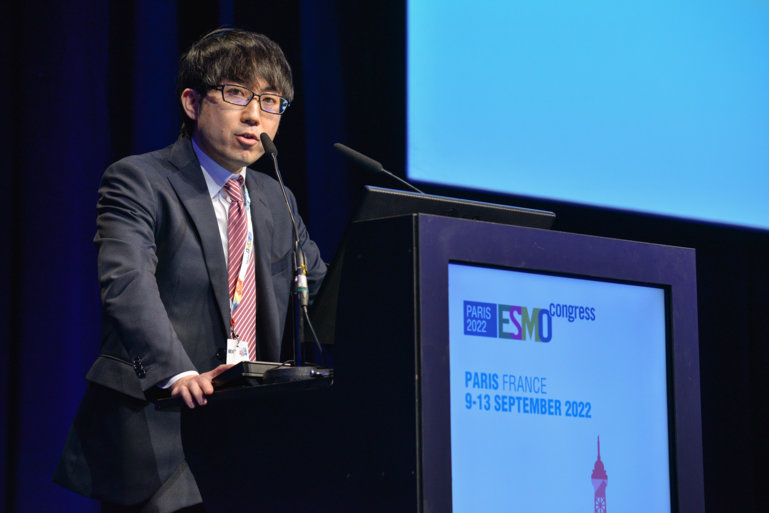Although further evidence is needed, targeting mutant KRAS with novel agents and combinations may offer new options for patients with advanced colorectal cancer
At ESMO Congress 2022, two studies that focus on targeting RAS in colorectal cancer (CRC) further support the promise of expanding treatment options for patients with KRAS G12C-mutated advanced disease, who currently have a poor prognosis.
Data from the dose expansion cohort (n=40) of the phase Ib CodeBreaK 101 study confirmed results presented for the dose exploration phase at last year’s ESMO annual congress (Ann Oncology. 2021;32(suppl_5):S530–S582; Abstract 434P), providing further evidence of the safety and tolerability of the combination of sotorasib and panitumumab in heavily pre-treated patients with metastatic KRAS G12C-mutated CRC (Abstract 315O). All 40 patients were evaluable for response. The confirmed objective response rate (ORR) was 30% (95% confidence interval [CI]: 16.6–46.5), with disease control rate [DCR] of 93% (95% CI: 79.6–98.4). Tumour shrinkage of any magnitude was observed in 88% of patients.
In the same setting, updated data from the phase I/II KRYSTAL-1 study also confirmed previous findings that adagrasib was well tolerated with or without cetuximab in heavily pre-treated patients (LBA24). In this study, clinical activity was observed for both adagrasib monotherapy (n=44) and adagrasib plus cetuximab (n=32), although more sustained responses were observed with the combination therapy (median duration of response [DOR] 7.6 months [95% CI: 5.7–not evaluable]) than with adagrasib monotherapy (median DOR 4.3 months [95% CI: 2.3–8.3]). In the combination group, ORR was 46% (13/28), DCR was 100% (28/28) and median progression-free survival (PFS) was 6.9 months (95% CI: 5.4–8.1). In the monotherapy group, ORR was 19% (8/43), DCR was 86% (37/43) and median PFS was 5.6 months (95% CI: 4.1–8.3).
Dr Rodrigo Dienstmann, from Grupo Oncoclínicas, São Paulo, Brazil, welcomed these data as, “KRAS-mutated advanced CRC is one of the few genomic subtypes with no approved targeted therapy, and patients with this subtype have a poorer prognosis than those with non-KRAS mutations (Onco Targets Ther. 2022;15:747–756). Around half of patients with CRC have KRAS mutations, but only approximately 3% have a G12C mutation (Onco Targets Ther. 2022;15:747–756).”
“These studies have relatively small patient numbers, which limits the ability to confirm the efficacy and safety of new treatments,” says Dienstmann, “However, they are an important step closer to expanding treatment options for patients with KRAS G12C-mutated CRC. Currently the standard of care is combinations of chemotherapy with anti-angiogenic agents such as bevacizumab, ziv-aflibercept or regorafenib, so the only option is switching between these agents. Until recently, KRAS was considered an undruggable target, and these data reinforce the potential for mutant-selective KRAS inhibitors in combination with ant-EGFR agents in advanced CRC.”
Dienstmann adds that, “The G12C variant is more common in patients with non-small cell lung cancer (NSCLC) (OncoTargets and Therapy. 2022;15:747–756), and sotorasib has now received US FDA (US FDA sotorasib) and EMA (EMA sotorasib) approval as monotherapy for previously treated advanced/metastatic KRAS G12C-mutated NSCLC. Regulatory approval of adagrasib for KRAS G12C-mutated NSCLC is also expected soon in this setting.”
Dienstmann highlights some differences in the biology of CRC compared with NSCLC. “In the two studies presented, ORRs of up to 30–40% were only observed in patients with CRC receiving combination treatments, whereas these rates are observed with monotherapy in NSCLC (N Engl J Med. 2021;384:2371–2381; J Clin Oncol. 2022;40[No.16_suppl]:9002–9002)”, he notes. “The response rates for these combination therapies in KRAS G12C mutated CRC are promising and comparable to what has been achieved with the selective BRAF inhibitor encorafenib plus anti-EGFR cetuximab in BRAFV600E mutated disease (N Engl J Med. 2019;381:1632–1643).”
Two phase III trials are now evaluating these combinations in patients with KRAS G12C-mutated CRC. KRYSTAL-10 is investigating adagrasib plus cetuximab as second-line treatment versus chemotherapy in the advanced/metastatic setting (NCT04793958), which Dienstmann considers to be “Very promising and a change in the way we think about treatment of this disease, as a chemotherapy-free option is investigated in second line.” CodeBreak 300 (NCT05198934) is evaluating sotorasib plus panitumumab versus investigator’s choice of treatment (trifluridine and tipiracil, or regorafenib) in previously treated metastatic CRC, which may incorporate the third-line setting.
“While this is a new way ahead in the treatment of advanced KRAS G12C-mutated CRC, only a small proportion of patients with KRAS mutations will benefit, as other KRAS mutations remain without targeted treatment. Further work is needed to understand the biology of KRAS-mutated CRC,” concludes Dienstmann, “Directly targeting other KRAS mutations with new selective agents and combinations, and indirectly targeting MAP kinase signalling with metabolic pathway inhibitors, are being examined in early clinical trials. As in the case of pancreatic cancers (Cancers. 2021;13:2429), KRAS mutants in CRC have an immunosuppressive phenotype and so trials are also evaluating immunotherapy combinations in an attempt to increase chemotherapy responses and achieve better survival outcomes.”
Abstracts presented:
Kuboki Y et al. Sotorasib in combination with panitumumab in refractory KRAS G12C-mutated colorectal cancer: safety and efficacy for phase 1B full expansion cohort. ESMO Congress 2022, Abstract 315O
Proffered Paper Session 2 – GI, lower digestive, 12.09.2022, h. 10:15 – 11:45, Fécamp Auditorium
Klempner S, et al. KRYSTAL-1: updated efficacy and safety of adagrasib (MRTX849) with or without cetuximab in patients with advanced colorectal cancer (CRC) harboring a KRASG12C mutation. ESMO Congress 2022, LBA24
Proffered Paper Session 2 – GI, lower digestive, 12.09.2022, h. 10:15 – 11:45, Fécamp Auditorium
Don't miss:
Are novel immunotherapeutics and targeted treatments going to transform the management of CRC?’, ESMO Congress 2022
Special Symposium, 09.09.2022, h. 14:00 – 15:30, Antibes Auditorium






